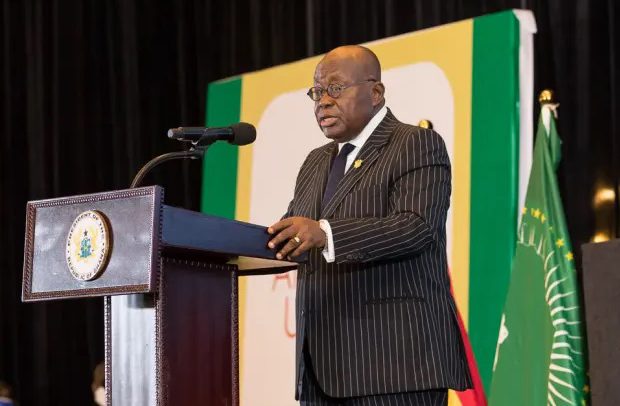President Akufo-Addo
President Akufo-Addo has had cause to ask member states of the Economic Community of West African States (ECOWAS) to respect decisions of the Community Court of Justice (CCJ) established by the sub-regional group.
Addressing attendees at the opening ceremony of the maiden external session of the Community Court of Justice in Accra on Monday, the President, who is also the substantive Chairman of ECOWAS, said national sovereignties should not be an impediment to the realisation of the objectives of the community of West African states.
According to President Akufo-Addo, “In spite of the best efforts of the ECOWAS Court of Justice to deliver on its mandate, it is constrained by the poor rate of enforcement of its judgments, which presently stands at some thirteen per cent.”
Unless member states comply with the judgments of the court, he insisted, “it will be difficult to build public confidence in the court,” and thus noted, “I appeal to all member states to ensure that they comply with their treaty obligation, by observing and obeying the judgments of the court.”
The CCJ sitting in Ghana from March 21 to April 1, 2022, forms part of the court’s agenda to bring its services closer to citizens in member countries, aside from its sitting at the court’s headquarters in Abuja, Nigeria.
The external sitting of the court is also aimed at creating public awareness of the court and its services, especially, the cases it hears, and how ordinary citizens can access it.
President Akufo-Addo has since advised all member states that are yet to appoint their competent national authorities for the enforcement of the judgments of the court to, as he put it, “respectfully urged to do so without further delay.”
Commenting on the expanded jurisdiction of the CCJ with regards to dealing with human right violations, President Akufo-Addo observed that the jurisdiction “does not require parties to exhaust all local remedies prior to invoking the jurisdiction of the court,” which has in certain cases, “resulted in judgments that member states find difficult to enforce, or are inconsistent with the concerned member states municipal law.”
On his part, Chief Justice, Kwasi Anin-Yeboah, indicated that the two weeks sitting of the ECOWAS Community Court will foster closer relations between Ghana’s Judiciary and the ECOWAS Community Court of Justice.
He stressed the need to review the current four-year term limit on the tenure of justices who preside over the Community Court.
He also noted that the decision in 2017, to review the number of judges of the CCJ from seven to five, ought to be reversed.
“In view of the expansive mandates of the ECOWAS Court of Justice, it is necessary to review the decision that was taken in 2017, that reduced the number of judges of the court from seven to five.
“The court, I believe, requires an adequate number of judges to discharge its functions very effectively,” the Chief Justice said.
Again, it would be necessary to review the four years’ non-renewable tenure of the members of the court, to enable the community to derive maximum benefits from their wealth of experience,” Chief Justice Anin-Yeboah added.
Attorney General and Minister for Justice, Godfred Yeboah Dame, congratulated the CCJ for its ruling in the case of Amnesty International & Others versus the Togolese Republic, which earned the court, the Global Freedom of Expression Prize 2022, given by the Columbia University, USA.
The court, in its ruling, held that the Togolese government violated the applicants’ right to freedom of expression by shutting down the internet during a September 2017 protest.
In August 2017, thousands of protesters called for the return of the 1992 Constitution, which guaranteed multi-party elections and a two-term limit for the head of state.
To disrupt protests, the respondent, State of Togo, cut off access to the internet from September 5-10, and again from September 19-21.
The court found that access to the internet is a “derivative right” as it “enhances the exercise of freedom of expression.”
As such, internet access is “a right that requires protection of the law,” and any interference with it “must be provided for by the law, specifying the grounds for such interference.”
As there was no national law upon which the right to internet access could be derogated from, the court concluded that the internet was not shut down in accordance with the law, and the Togolese government had violated Article 9 of the African Charter on Human and Peoples’ Rights.
The court subsequently ordered Togo to take measures to guarantee the “non-occurrence” of a future similar situation, implement laws to meet their obligations with the right to freedom of expression, and compensate each applicant to the sum of about $3,500 USD.
Justices of the ECOWAS
Court
The current five-member adjudicating body of the court comprises of Justice Edward Amoako Asante, a Court of Appeal judge in Ghana, who is the President of the court. Justice Gberi-bè Ouattara from Côte d’Ivoire is Vice President of the court.
The three other members of the court are Justice Dupe Atoki, Nigeria; Justice Keikura Bangura, Sierra Leone and Justice Januária Tavares Silva Moreira Costa, Cape Verde.
By Charles Takyi-Boadu


